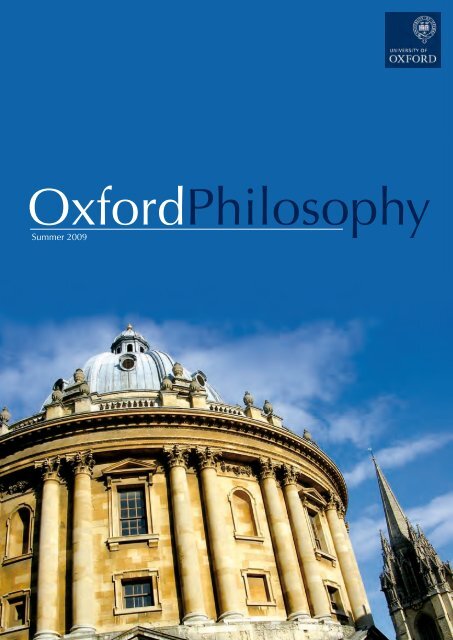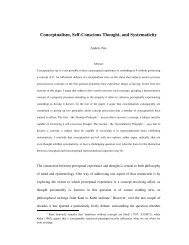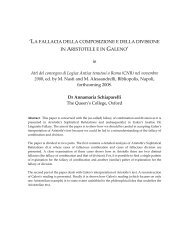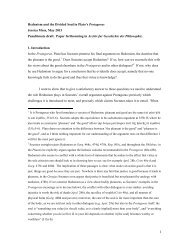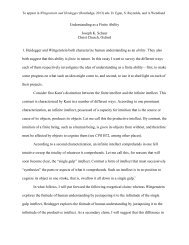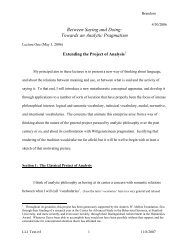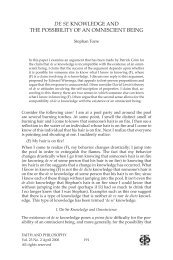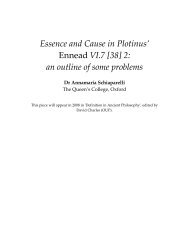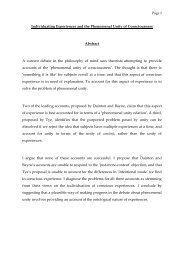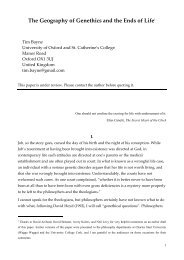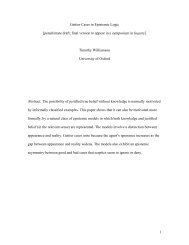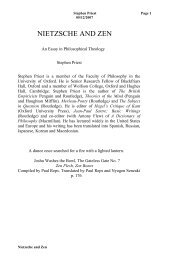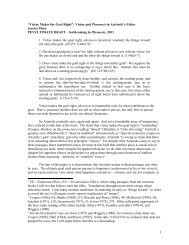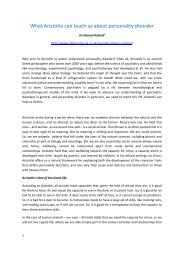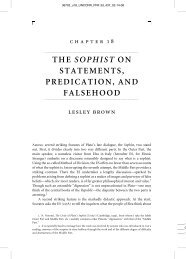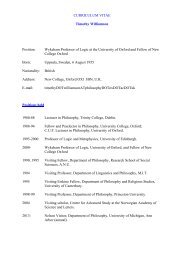OxfordPhilosophy - Faculty of Philosophy - University of Oxford
OxfordPhilosophy - Faculty of Philosophy - University of Oxford
OxfordPhilosophy - Faculty of Philosophy - University of Oxford
You also want an ePaper? Increase the reach of your titles
YUMPU automatically turns print PDFs into web optimized ePapers that Google loves.
<strong><strong>Oxford</strong><strong>Philosophy</strong></strong><br />
Summer 2009
Welcome<br />
Welcome to the first issue <strong>of</strong> <strong>Oxford</strong> <strong>Philosophy</strong>, with news about<br />
achievements and initiatives and about core values maintained.<br />
We are sending it to friends <strong>of</strong> the <strong>Philosophy</strong> <strong>Faculty</strong> including<br />
thousands <strong>of</strong> people who studied philosophy at <strong>Oxford</strong> as undergraduates or<br />
graduates. We hope that it may awaken pleasant memories <strong>of</strong> your time here.<br />
The <strong>Oxford</strong> <strong>Philosophy</strong> <strong>Faculty</strong> is one <strong>of</strong> the largest in the world and widely<br />
recognised to be amongst the best. The 2009 edition <strong>of</strong> the Philosophical<br />
Gourmet Report, whose rankings are regarded as measures <strong>of</strong> faculty quality<br />
and reputation, places <strong>Oxford</strong> <strong>Philosophy</strong> outright second in the Englishspeaking<br />
world.<br />
We are committed to delivering undergraduate education in which the tutorial<br />
system is central and providing a learning environment in which students<br />
can achieve their fullest potential. We also aspire to attract the world’s best<br />
graduate students and to <strong>of</strong>fer excellent graduate education characterised by<br />
the intensive dialectical engagement that philosophy requires.<br />
The project <strong>of</strong> creating a newsletter for alumni and friends <strong>of</strong> the <strong>Faculty</strong><br />
was an initiative <strong>of</strong> my predecessor as Chair <strong>of</strong> the <strong>Philosophy</strong> <strong>Faculty</strong><br />
Board, Pr<strong>of</strong>essor Roger Crisp. He oversaw a period <strong>of</strong> great change and<br />
renewal within the <strong>Faculty</strong>, and describes his two years as Chair as “the<br />
most challenging and interesting <strong>of</strong> the thirty years I have now spent at this<br />
<strong>University</strong>”. We are greatly indebted to Roger for his skilful management.<br />
On the pages that follow you will find reports <strong>of</strong> teaching and students, <strong>of</strong><br />
research and books, <strong>of</strong> recent arrivals and colleagues sadly missed. There<br />
is information about major events in the next year or so, including guest<br />
lectures, and there are links to our website where, indeed, this issue <strong>of</strong> <strong>Oxford</strong><br />
<strong>Philosophy</strong> is also available.<br />
Pr<strong>of</strong>essor Martin Davies<br />
Chair <strong>of</strong> the <strong>Philosophy</strong> <strong>Faculty</strong> Board<br />
If you have comments or suggestions about this publication,<br />
or would like further information about any aspect <strong>of</strong><br />
<strong>Philosophy</strong> at <strong>Oxford</strong>, please contact us:<br />
email: news@philosophy.ox.ac.uk<br />
tel: +44 (0)1865 276934<br />
fax: +44 (0)1865 276932<br />
<strong>Oxford</strong> <strong>Philosophy</strong><br />
<strong>Faculty</strong> <strong>of</strong> <strong>Philosophy</strong>, <strong>University</strong> <strong>of</strong> <strong>Oxford</strong><br />
10 Merton Street, <strong>Oxford</strong>, OX1 4JJ, UK<br />
www.philosophy.ox.ac.uk<br />
Editors<br />
Design & Photography<br />
Printed by<br />
Tom Moore<br />
Paul Lodge<br />
Keiko Ikeuchi (www.keikoikeuchi.com)<br />
Fingerprint Ltd (Tel : 01865 848080)
news<br />
<strong>Oxford</strong> Pioneers the Study<br />
<strong>of</strong> Neuroethics<br />
On 1 January 2009, the UK’s first<br />
neuroethics centre was launched<br />
following an award <strong>of</strong> more than<br />
£800,000 from the Wellcome Trust.<br />
The <strong>Oxford</strong> Centre for Neuroethics<br />
is directed by Julian Savulescu, and<br />
brings together researchers from a<br />
wide range <strong>of</strong> disciplines to address<br />
current advances in neurosciences<br />
and related areas <strong>of</strong> clinical medicine.<br />
It is hosted by the <strong>Oxford</strong> Uehiro<br />
Centre for Practical Ethics and the<br />
<strong>Oxford</strong> <strong>Philosophy</strong> <strong>Faculty</strong>.<br />
www.neuroethics.ox.ac.uk<br />
Our Newest Tutorial<br />
Fellow<br />
The <strong>Faculty</strong> is delighted to<br />
announce that, from October 2009,<br />
Dr Hilary Greaves will take up a<br />
Tutorial Fellowship at Somerville<br />
College. Hilary completed her<br />
PhD in <strong>Philosophy</strong> at Rutgers<br />
<strong>University</strong> in New Jersey in 2008.<br />
Since October 2007 she has held<br />
a Junior Research Fellowship in<br />
<strong>Philosophy</strong> at Merton College. She<br />
is a wonderful addition to <strong>Oxford</strong>’s<br />
philosophy <strong>of</strong> physics research<br />
community, which is already the<br />
leading group <strong>of</strong> philosophers <strong>of</strong><br />
physics in the world.<br />
In Memoriam:<br />
David Pears<br />
The <strong>Faculty</strong> is sad to announce the<br />
death <strong>of</strong> David Pears on 1 July 2009,<br />
aged 87. Pears taught <strong>Philosophy</strong><br />
in <strong>Oxford</strong> for nearly forty years as<br />
Fellow, Reader and finally Pr<strong>of</strong>essor,<br />
first at Corpus Christi and then at<br />
Christ Church. Although he wrote<br />
on a wide range <strong>of</strong> topics, his major<br />
contribution was in the philosophy<br />
<strong>of</strong> mind and the study <strong>of</strong> Russell<br />
and Wittgenstein. He was one <strong>of</strong><br />
the outstanding members <strong>of</strong> the<br />
generation who, in the 1950s and<br />
early 1960s, made <strong>Oxford</strong> the centre<br />
<strong>of</strong> the philosophical world.<br />
Poster by John E French<br />
The Common Room, Christ Church<br />
MP40: A Celebration <strong>of</strong> 40 years <strong>of</strong> <strong>Oxford</strong>’s Mathematics and <strong>Philosophy</strong> Degree<br />
On Saturday 4 and Sunday 5 July 2009, a<br />
programme <strong>of</strong> special events was held to celebrate<br />
forty years <strong>of</strong> Maths and <strong>Philosophy</strong> at <strong>Oxford</strong>.<br />
Amongst those attending were Alan Taylor (Merton,<br />
1968), who sat the very first examination in Maths<br />
and <strong>Philosophy</strong>, Mods in 1969, and Derek Goldrei<br />
(Magdalen, 1967), who took the first Finals in<br />
1970. On Saturday, following talks by Dana Scott<br />
and Angus Macintyre (the first two Pr<strong>of</strong>essors<br />
<strong>of</strong> Mathematical Logic), there was a dinner with<br />
speeches by Hilary Priestley, Dan Isaacson,<br />
Michael Dummett, John Lucas, and Dana Scott.<br />
Robin Gandy, who played such an important<br />
role in establishing the course when he arrived<br />
in 1969, was warmly remembered. On Sunday,<br />
there was a series <strong>of</strong> lectures by Maths and<br />
<strong>Philosophy</strong> graduates, including Ian Rumfitt and<br />
Tim Williamson.<br />
1
people<br />
The membership <strong>of</strong> the<br />
<strong>Philosophy</strong> <strong>Faculty</strong> has<br />
changed dramatically<br />
over the past few<br />
years, with more than<br />
half <strong>of</strong> the College<br />
Fellows and Pr<strong>of</strong>essors<br />
taking up their positions<br />
since 2003.<br />
In the past, Fellows<br />
<strong>of</strong>ten arrived in <strong>Oxford</strong><br />
as undergraduates and<br />
never left. In recent<br />
years the pattern has<br />
been very different.<br />
Five <strong>of</strong> our recent<br />
arrivals discuss how<br />
their lives led them to<br />
<strong>Oxford</strong> and what<br />
attracted them to come<br />
here.<br />
Thomas Johansen<br />
Brasenose College<br />
Research interests: Ancient<br />
<strong>Philosophy</strong>; <strong>Philosophy</strong> <strong>of</strong> Mind.<br />
After my doctorate (from<br />
Cambridge) I taught for thirteen<br />
years at Aberdeen, Bristol and<br />
Edinburgh. I honestly hadn’t<br />
thought I’d ever move again within<br />
the UK! But when the opportunity<br />
arose two considerations in<br />
particular changed my mind.<br />
The first was a preference for<br />
the tutorial system <strong>of</strong> teaching:<br />
conversation, especially in<br />
philosophy, beats microphone<br />
and PowerPoint. True, as I<br />
was warned, I have ended up<br />
teaching more hours than at my<br />
previous university; but then you<br />
tend not to mind so much when<br />
you’re enjoying the work. My<br />
second consideration was the<br />
belief (correct, as it turned out)<br />
that I could learn a lot from the<br />
philosophers here. My area <strong>of</strong><br />
interest, ancient philosophy, is<br />
extraordinarily well represented,<br />
and valued, at <strong>Oxford</strong>. It is good to<br />
know that when you’re struggling<br />
with a difficult issue, say in<br />
Aristotle’s psychology, you can get<br />
great help just by talking to your<br />
colleagues at the next seminar.<br />
Gonzalo Rodriguez-Pereyra<br />
Oriel College<br />
Research interests: Metaphysics;<br />
Descartes; Leibniz.<br />
I am now in <strong>Oxford</strong> for the second<br />
time in my career. I was previously<br />
Gilbert Ryle Fellow at Hertford<br />
College and a CUF lecturer (2001-<br />
2005). Having taught at different<br />
universities, I think what is unique<br />
to <strong>Oxford</strong> is its commitment to excel<br />
in both teaching (at undergraduate<br />
and graduate levels) and research.<br />
The undergraduate tutorial system<br />
<strong>of</strong> teaching enables the tutor<br />
to accompany the intellectual<br />
development <strong>of</strong> his or her students,<br />
and this, I find, is a very rewarding<br />
experience – as rewarding as<br />
undergraduates themselves find<br />
the experience <strong>of</strong> the tutorial<br />
system. <strong>Oxford</strong> also provides<br />
an incomparable setting to do<br />
philosophy: it has a huge number <strong>of</strong><br />
brilliant and talented philosophers<br />
and students, and lots <strong>of</strong> seminars,<br />
talks, conferences and lectures<br />
taking place every week. It is a<br />
festival <strong>of</strong> philosophy.<br />
2
Frank Arntzenius<br />
<strong>University</strong> College<br />
Research interests: <strong>Philosophy</strong> <strong>of</strong><br />
Physics; Decision Theory.<br />
Chris Timpson<br />
Brasenose College<br />
Research interests: <strong>Philosophy</strong> <strong>of</strong><br />
Physics; <strong>Philosophy</strong> <strong>of</strong> Science;<br />
<strong>Philosophy</strong> <strong>of</strong> Mind and Language.<br />
I came to Brasenose from the<br />
<strong>University</strong> <strong>of</strong> Leeds. I knew, roughly<br />
speaking, what to expect at <strong>Oxford</strong><br />
since I was an undergraduate<br />
at Queen’s reading Physics and<br />
<strong>Philosophy</strong> (1994-1998), where I<br />
also went on to take the BPhil and<br />
DPhil.<br />
Returning after an enjoyable and<br />
stimulating sojourn elsewhere helps<br />
throw <strong>Oxford</strong>’s special qualities<br />
into relief. The degree <strong>of</strong> academic<br />
freedom one enjoys – in research,<br />
but especially in teaching – is<br />
unparalleled. The quality <strong>of</strong> the<br />
students is excellent; and the<br />
opportunity to teach by tutorial<br />
simply a joy. The desire to return<br />
to tutorial teaching was one <strong>of</strong> my<br />
main reasons for coming back to<br />
<strong>Oxford</strong>. The fact that it is arguably<br />
the strongest research centre in the<br />
world in philosophy <strong>of</strong> physics was<br />
a help too. Tutorial teaching is very<br />
much more like doing philosophy<br />
than teaching it. Everything at<br />
<strong>Oxford</strong> at every level is predicated<br />
on the pursuit <strong>of</strong> academic<br />
excellence, both in teaching and in<br />
research. It is a great thing to be<br />
a member <strong>of</strong> an institution where<br />
academic ideals are so deeply<br />
embedded.<br />
I have always been fascinated<br />
by the question <strong>of</strong> what the<br />
fundamental structure <strong>of</strong> the world<br />
is, and I took it to be obvious that<br />
physics provides us with the best<br />
insights into this. Consequently<br />
I chose to do an undergraduate<br />
degree in theoretical physics in<br />
Holland. However, I soon discovered<br />
that physicists tend not to be terribly<br />
interested in foundational questions.<br />
So I switched to philosophy.<br />
I did a Masters and a PhD in<br />
philosophy <strong>of</strong> science at the LSE<br />
(interspersed by a couple <strong>of</strong> years<br />
<strong>of</strong> work for Friends <strong>of</strong> the Earth).<br />
After that I had a succession <strong>of</strong><br />
jobs in the US, during which my<br />
interests became broader, so as<br />
to include Bayesian epistemology,<br />
decision theory, and metaphysics.<br />
Perhaps the unifying theme among<br />
my interests is that I love puzzles,<br />
at least puzzles which have clear<br />
answers. I was lucky enough to<br />
spend ten years at Rutgers, a<br />
superb department. I then had a<br />
sabbatical in <strong>Oxford</strong>, which I really<br />
enjoyed, both pr<strong>of</strong>essionally and<br />
personally. So I applied for a job<br />
at <strong>University</strong> College and was<br />
lucky enough to get it. The <strong>Oxford</strong><br />
<strong>Philosophy</strong> <strong>Faculty</strong> is fantastic; it<br />
has the largest and best group <strong>of</strong><br />
philosophers <strong>of</strong> physics in the world,<br />
it has great graduate students, the<br />
best undergraduates, and I love the<br />
tutorial system. And <strong>Oxford</strong> is very<br />
pretty. I intend never to move again.<br />
Ofra Magidor<br />
Balliol College<br />
Research interests: <strong>Philosophy</strong> <strong>of</strong><br />
Logic and Language; Metaphysics<br />
and Epistemology.<br />
I grew up in Jerusalem, where I<br />
completed an undergraduate degree<br />
in philosophy, mathematics, and<br />
computer science. I decided it would<br />
be interesting to continue my studies<br />
abroad, and applied for the BPhil. I<br />
knew relatively little about <strong>Oxford</strong>,<br />
and wasn’t sure quite what to expect.<br />
What I discovered when I arrived<br />
was very exciting. Opening the<br />
lecture list I was dazzled by the<br />
number and variety <strong>of</strong> lectures and<br />
seminars. Added to these was an<br />
endless flow <strong>of</strong> visiting speakers,<br />
philosophical societies, and reading<br />
groups. And then there were my<br />
fellow graduate students – people<br />
from a wide range <strong>of</strong> backgrounds<br />
who shared a passion for philosophy<br />
and were keen to discuss their ideas.<br />
By the time I completed my BPhil, I<br />
had become almost addicted to this<br />
intensive level <strong>of</strong> intellectual activity<br />
so I decided to stay on and complete<br />
a DPhil.<br />
I was delighted when I was <strong>of</strong>fered a<br />
Tutorial Fellowship at Balliol College.<br />
It allows me to continue taking part<br />
in this remarkable community and to<br />
have the opportunity to play a role<br />
in shaping the present and future <strong>of</strong><br />
<strong>Oxford</strong> <strong>Philosophy</strong>.<br />
3
STUDYING<br />
Undergraduate degrees<br />
The <strong>Faculty</strong> is committed<br />
to providing tutorial-based<br />
undergraduate education <strong>of</strong> the<br />
highest quality led by world-class,<br />
research-active faculty. Teaching<br />
undergraduates is our primary<br />
and most highly valued mode <strong>of</strong><br />
engagement with society, both<br />
nationally and internationally.<br />
Students at <strong>Oxford</strong> continue to<br />
enjoy the opportunity to study<br />
philosophy in combination with<br />
at least one other subject. We<br />
<strong>of</strong>fer seven joint degrees, <strong>of</strong><br />
which PPE is the most celebrated<br />
example – inseparable, indeed,<br />
from the <strong>Oxford</strong> brand.<br />
There is regular discussion<br />
between <strong>Philosophy</strong> and its<br />
partners about the content <strong>of</strong><br />
the joint degrees: recently, a<br />
<strong>Philosophy</strong> <strong>of</strong> Science paper was<br />
introduced which is especially<br />
suited to students reading<br />
Physics and <strong>Philosophy</strong>.<br />
From October 2011 a new<br />
Neuroscience degree will replace<br />
the Psychology/Physiology<br />
combination in the PPP degree.<br />
We look forward to attracting<br />
students to the reshaped<br />
Psychology and <strong>Philosophy</strong><br />
degree, continuing to build on<br />
our strength in philosophy <strong>of</strong><br />
mind, and we hope to ensure<br />
that students on the new<br />
Neuroscience course will also<br />
have the opportunity to <strong>of</strong>fer<br />
some <strong>Philosophy</strong> subjects.<br />
www.philosophy.ox.ac.uk/admissions/undergraduate<br />
Postgraduate degrees<br />
The <strong>Philosophy</strong> <strong>Faculty</strong> boasts<br />
one <strong>of</strong> the strongest groups <strong>of</strong><br />
postgraduate students in the<br />
world. Our two-year masters-level<br />
course, the BPhil, continues to<br />
provide a rigorous philosophical<br />
training that is the foundation for<br />
doctoral study, whether at <strong>Oxford</strong><br />
or elsewhere, and for subsequent<br />
academic careers in the UK and<br />
around the globe.<br />
As well as accepting numerous<br />
postdoctoral positions, over the<br />
past three years our students<br />
have taken up lectureships at<br />
the universities <strong>of</strong> East Anglia,<br />
Exeter, Leeds, London (both<br />
UCL and King’s), York, and<br />
<strong>Oxford</strong>. A number have gone<br />
further afield, accepting tenuretrack<br />
Assistant Pr<strong>of</strong>essor<br />
positions at Queen’s College<br />
New York, Cornell <strong>University</strong>, and<br />
McGill <strong>University</strong> in Montreal.<br />
In October 2008, the first group<br />
<strong>of</strong> students arrived for our new<br />
Master <strong>of</strong> Studies degree in<br />
Ancient <strong>Philosophy</strong>. This oneyear<br />
course is designed to<br />
prepare those with a background<br />
in Classics for doctoral study<br />
on figures such as Plato and<br />
Aristotle.<br />
www.philosophy.ox.ac.uk/admissions/graduate<br />
4
pr<strong>of</strong>ile<br />
James Studd<br />
DPhil student in <strong>Philosophy</strong><br />
Corpus Christi College<br />
In 2005, James<br />
was awarded the<br />
Henry Wilde Prize<br />
for outstanding<br />
performance<br />
in <strong>Philosophy</strong><br />
FINALS. In 2008, he<br />
was awarded The<br />
inaugural Gilbert<br />
Ryle Prize for<br />
best performance<br />
in the BPhil<br />
Examination.<br />
Not unusually perhaps, my<br />
taking up philosophy was by<br />
and large a lucky accident. I<br />
didn’t study any philosophy at school,<br />
but wary <strong>of</strong> studying maths on its<br />
own, I set on studying maths and<br />
something at degree level. After<br />
battling with a few <strong>of</strong> the readings<br />
suggested in university prospectuses,<br />
I resolved to make the something<br />
philosophy.<br />
It didn’t take<br />
me long<br />
to settle<br />
on <strong>Oxford</strong><br />
<strong>University</strong>.<br />
The collegiate<br />
set-up and<br />
the highly<br />
personalised<br />
tutorial system<br />
I thrived<br />
on the<br />
intellectual<br />
challenges<br />
greatly appealed to me; as did the<br />
four-year course, which permitted<br />
the simultaneous study <strong>of</strong> both<br />
mathematics and philosophy.<br />
As an undergraduate at Merton I<br />
thrived on the intellectual challenges<br />
posed by both subjects, but it was<br />
the quality <strong>of</strong> the teaching that<br />
was truly outstanding. Even as<br />
an undergraduate, I was given a<br />
weekly opportunity to discuss my<br />
work, <strong>of</strong>ten on a one-to-one basis,<br />
with inspirational, world-class<br />
philosophers such as David Bostock,<br />
Ralph Wedgwood, Ian Rumfitt and<br />
Dorothy Edgington. I quickly learned<br />
that my interest lay primarily in the<br />
philosophical questions that arise<br />
concerning logic, language and<br />
mathematics.<br />
After finishing my degree, it took<br />
me several months to realise that I<br />
wanted to pursue postgraduate study,<br />
and perhaps a career, in philosophy.<br />
It was the strength <strong>of</strong> the <strong>University</strong>’s<br />
faculty, its active graduate body, and<br />
the comprehensive course structure<br />
and intellectual rigour <strong>of</strong>fered by the<br />
two-year BPhil that persuaded me<br />
to apply to <strong>Oxford</strong> once more. When<br />
Corpus Christi College generously<br />
<strong>of</strong>fered me a scholarship to pursue<br />
the degree I accepted immediately.<br />
The BPhil is a unique course,<br />
combining elements <strong>of</strong> a taught and<br />
research masters degree. In the<br />
first year, three subjects are taught;<br />
then, after a notorious fourteen-week<br />
period <strong>of</strong> examination, students<br />
engage in research for their thesis.<br />
For my part, I returned to the study<br />
<strong>of</strong> Frege, Metaphysics, and the<br />
<strong>Philosophy</strong> <strong>of</strong> Language under the<br />
excellent tuition <strong>of</strong> Daniel Isaacson,<br />
Oliver Pooley and Tim Williamson.<br />
Then, under the patient and incisive<br />
supervision <strong>of</strong> Gabriel Uzquiano, I<br />
undertook research at the intersection<br />
<strong>of</strong> the philosophy <strong>of</strong> language and<br />
the philosophy <strong>of</strong> mathematics,<br />
focusing on certain problems bound<br />
up with mathematical and semantic<br />
objects and our attempts to engage in<br />
absolutely general enquiries.<br />
Over the course <strong>of</strong> the BPhil I decided<br />
that I definitely wanted to pursue a<br />
career in academic philosophy if I<br />
could. Since I was keen to build on<br />
the research I had undertaken for<br />
my BPhil thesis, there was no real<br />
question <strong>of</strong> leaving <strong>Oxford</strong> for my<br />
doctorate. Few faculties carry even<br />
one philosopher who has published<br />
work on this rather specialised area<br />
<strong>of</strong> research; <strong>Oxford</strong> has two!<br />
5
news<br />
Relocation Relocation<br />
The development <strong>of</strong> The Radcliffe<br />
Observatory Quarter (ROQ)<br />
on the site <strong>of</strong> the old Radcliffe<br />
Infirmary is the most ambitious project<br />
the <strong>University</strong> has undertaken for a<br />
hundred years. At its heart will be a new<br />
Humanities Centre. The first phase <strong>of</strong> its<br />
construction will provide new homes for<br />
English, History and Theology, as well as<br />
<strong>Philosophy</strong>.<br />
The design for the ROQ is by Bennetts<br />
Associates, who were awarded UK<br />
Architectural Practice <strong>of</strong> the Year in the<br />
2006 Buildings Awards. It incorporates<br />
the Radcliffe Observatory, a Grade I<br />
listed building. The two buildings making<br />
up the Humanities Centre will face<br />
the Observatory across a landscaped<br />
space, and their long arms will embrace<br />
the glass superstructure <strong>of</strong> a new<br />
Humanities Library. The whole campus<br />
will create a vibrant social, cultural and<br />
academic centre, with cafés and spaces<br />
for art exhibitions, films and musical<br />
performances, as well as lectures,<br />
seminars and conferences.<br />
The <strong>Philosophy</strong> Centre at 10 Merton<br />
Street has provided a very pleasant<br />
home for the <strong>Faculty</strong> for more than<br />
twenty-five years, but it has too little<br />
space for our needs in the 21st century.<br />
The new site <strong>of</strong>fers us many exciting<br />
opportunities. For the first time, we will<br />
be able to locate our research projects<br />
under the same ro<strong>of</strong> as the <strong>Philosophy</strong><br />
Centre, helping to integrate their work<br />
more fully with the <strong>Faculty</strong>, and to<br />
provide <strong>of</strong>fices for all our Statutory<br />
Pr<strong>of</strong>essors and many <strong>of</strong> our <strong>University</strong><br />
Lecturers.<br />
Most importantly, the ROQ will allow<br />
us to establish a Graduate Centre to<br />
meet the needs <strong>of</strong> our world-class<br />
graduate students. We will be able<br />
to provide these young philosophers<br />
with dedicated work and social space,<br />
in close proximity to the integrated<br />
Humanities Library, and right next<br />
door to many <strong>of</strong> the <strong>Faculty</strong>’s leading<br />
academic staff.<br />
6<br />
Illustration and architectural model<br />
are artist impressions <strong>of</strong> the new<br />
Radcliffe Observatory Quarter<br />
by Bennetts Associates.
focus<br />
<strong>Philosophy</strong><br />
<strong>of</strong> Physics<br />
at <strong>Oxford</strong><br />
<strong>Oxford</strong> is the world’s<br />
preeminent centre for<br />
philosophy <strong>of</strong> physics. The<br />
<strong>Faculty</strong> is ranked outright first<br />
for philosophy <strong>of</strong> physics in the<br />
latest Philosophical Gourmet<br />
Report and contains the largest<br />
concentration <strong>of</strong> philosophers<br />
<strong>of</strong> physics in the world.<br />
The philosophy <strong>of</strong> physics community is<br />
very active, both in teaching and research.<br />
The undergraduate Physics and <strong>Philosophy</strong><br />
course celebrated its fortieth anniversary<br />
this year, and we have just launched a<br />
new specialist Master <strong>of</strong> Studies course<br />
in <strong>Philosophy</strong> <strong>of</strong> Physics. It is aimed at<br />
students whose undergraduate degree<br />
is primarily in physics and who otherwise<br />
might not have applied for graduate study in<br />
<strong>Philosophy</strong> at <strong>Oxford</strong>.<br />
http://users.ox.ac.uk/~ppox<br />
Image: Courtesy <strong>of</strong> Max Tegmark<br />
Research interests<br />
The first decades <strong>of</strong> the 20th<br />
century saw the comfortable<br />
certainties <strong>of</strong> Newtonian physics<br />
thrown into doubt, first by<br />
Einstein’s theories <strong>of</strong> special<br />
and general relativity, and then<br />
by the counter-intuitive principles<br />
<strong>of</strong> quantum mechanics. <strong>Oxford</strong><br />
philosophers are making<br />
significant contributions to the<br />
attempt to make sense <strong>of</strong> these<br />
important conceptual changes.<br />
Hilary Greaves, Simon<br />
Saunders, Chris Timpson, and<br />
David Wallace are applying<br />
themselves to quantum<br />
mechanics, especially<br />
the baffling ‘many worlds’<br />
interpretation developed by<br />
the physicist Hugh Everett<br />
in 1957. Everett argued that<br />
quantum mechanics predicts the<br />
existence <strong>of</strong> a vast number <strong>of</strong><br />
Pr<strong>of</strong>ile: Harvey Brown<br />
In 2006, Harvey Brown,<br />
Pr<strong>of</strong>essor <strong>of</strong> <strong>Philosophy</strong> <strong>of</strong><br />
Physics, received a prestigious<br />
Lakatos Award for his book<br />
Physical Relativity (2005). The<br />
Award is given annually for an<br />
outstanding contribution to the<br />
philosophy <strong>of</strong> science. Physical<br />
Relativity is an attempt to prise<br />
apart the core <strong>of</strong> Einstein’s<br />
theories <strong>of</strong> relativity – the special<br />
and the general – from the<br />
issue <strong>of</strong> space-time reality. In<br />
the case <strong>of</strong> the special theory<br />
<strong>of</strong> 1905, Harvey examines<br />
the historical underpinnings<br />
branching worlds within a single<br />
universe, in which everything<br />
that could happen (according to<br />
the theory) does happen. The<br />
subtle issue as to how quantum<br />
indeterminacy, and hence<br />
probability, fits into this picture<br />
has been the subject <strong>of</strong> detailed<br />
study by the <strong>Oxford</strong> group.<br />
The light that relativity<br />
theory sheds on traditional<br />
philosophical problems related<br />
to the nature <strong>of</strong> space and time,<br />
posed by the ancient Greeks<br />
and more recently by Newton,<br />
Descartes and Leibniz, has<br />
been the subject <strong>of</strong> recent<br />
research by Frank Arntzenius<br />
and Harvey Brown, as well as<br />
Oliver Pooley, who was awarded<br />
a Philip Leverhulme Prize in<br />
2007 for work by an outstanding<br />
young scholar.<br />
<strong>of</strong> Einstein’s work, and why<br />
it was that Einstein later had<br />
misgivings about some aspects<br />
<strong>of</strong> the way he first formulated<br />
his theory. The book questions<br />
the now fashionable view that<br />
it is the geometric structure <strong>of</strong><br />
four-dimensional space-time<br />
itself that provides the central<br />
explanatory principle in the<br />
theory (something Einstein<br />
himself never defended). At the<br />
end <strong>of</strong> the book, Harvey argues<br />
that the subtle way in which<br />
special relativity fits into general<br />
relativity – Einstein’s theory<br />
<strong>of</strong> gravity – is fully compatible<br />
with the somewhat unorthodox<br />
position set out earlier. He<br />
concludes that caution is<br />
in order when it comes to<br />
interpreting Einstein’s theory <strong>of</strong><br />
gravity as a theory about the<br />
very fabric <strong>of</strong> space-time.<br />
In 2007, Harvey Brown was<br />
elected a Fellow <strong>of</strong> the British<br />
Academy. He served as<br />
President <strong>of</strong> the British Society<br />
for the <strong>Philosophy</strong> <strong>of</strong> Science<br />
from 2007 to 2009.<br />
7
Article<br />
Armchair <strong>Philosophy</strong><br />
By Timothy Williamson<br />
The front cover <strong>of</strong> The<br />
<strong>Philosophy</strong> <strong>of</strong> <strong>Philosophy</strong><br />
(Blackwell, 2007) shows<br />
‘Portrait <strong>of</strong> Olga in an Armchair’.<br />
I wanted an armchair because<br />
the book is about the problem <strong>of</strong><br />
armchair knowledge. <strong>Philosophy</strong><br />
appears to be an attempt to gain<br />
knowledge <strong>of</strong> the world without<br />
bothering to get up out <strong>of</strong> one’s<br />
armchair and look at what the world<br />
is actually like. How can such an<br />
attempt possibly succeed? There<br />
was a more obvious choice for the<br />
cover, Rembrandt’s ‘Old Man in an<br />
Armchair’. He is pensive, whitebearded,<br />
dressed in antique robes:<br />
the very image <strong>of</strong> a traditional<br />
philosopher as anti-philosophers<br />
imagine us, moribund leftovers from<br />
a pre-scientific age. Picasso’s Olga is<br />
young and elegant; what she’s sitting<br />
on isn’t very obviously an armchair.<br />
The message: armchair knowledge<br />
isn’t what you think it is.<br />
In the twentieth century, philosophers<br />
liked to argue that philosophy isn’t<br />
really an attempt to gain knowledge<br />
<strong>of</strong> the extra-linguistic world at all:<br />
either it seeks only knowledge <strong>of</strong><br />
our own language, which we take<br />
with us to the armchair, or what<br />
it seeks is not really knowledge<br />
but rather clarification, achieved<br />
through reflection on the use <strong>of</strong><br />
words or rules <strong>of</strong> grammar. That was<br />
the ‘Linguistic Turn’. Although the<br />
emphasis gradually changed from<br />
words to concepts, the underlying<br />
idea remained the same: philosophy<br />
does not try to gain substantive<br />
knowledge <strong>of</strong> an extra-linguistic,<br />
extra-conceptual world. Scale down<br />
your ambitions and you can stay at<br />
home.<br />
The unambitious picture does<br />
not fit much <strong>of</strong> contemporary<br />
philosophy. <strong>Philosophy</strong> <strong>of</strong> physics is<br />
continuous with theoretical physics.<br />
Contemporary metaphysicians want<br />
to know the nature <strong>of</strong> change or<br />
consciousness, not just the nature<br />
<strong>of</strong> our concepts <strong>of</strong> them. These<br />
ambitions make the problem <strong>of</strong><br />
armchair knowledge all the more<br />
acute. Isn’t it time that philosophy<br />
handed over to natural science?<br />
The book defends the use <strong>of</strong><br />
armchair methods to gain substantive<br />
knowledge <strong>of</strong> the extra-linguistic,<br />
extra-conceptual world. Here is one<br />
way it can happen. We learn to apply<br />
concepts on the basis <strong>of</strong> perception.<br />
We acquire skills in applying them<br />
on that ‘online’ basis which go far<br />
beyond what is required simply to<br />
possess the concepts. For example,<br />
you may possess the concept <strong>of</strong><br />
causation while being very bad at<br />
determining what caused what. But<br />
you may also become quite good<br />
at making such determinations.<br />
We also have an ability to transfer<br />
skills in applying concepts online<br />
to ‘<strong>of</strong>fline’ applications in the<br />
imagination, for example when we<br />
assess counterfactual conditionals<br />
like ‘If you had flicked the switch, you<br />
would have caused the light to come<br />
on’. Sometimes, such assessments<br />
require minimal background<br />
knowledge; the conceptual skills<br />
suffice. Philosophers’ thought<br />
experiments are like that. For<br />
example, your skill with the concept<br />
<strong>of</strong> knowledge, now applied <strong>of</strong>fline,<br />
may enable you to recognise in<br />
your armchair that if at 12.37 you<br />
had seen a stopped digital clock<br />
reading ‘12.37’, without realising<br />
that it was stopped, you would<br />
have had a justified true belief, but<br />
not knowledge, that the time was<br />
12.37. You thereby learn something<br />
about knowledge, not just about the<br />
concept <strong>of</strong> knowledge. You do so<br />
not simply because you have the<br />
concept <strong>of</strong> knowledge — someone<br />
can have it and be lousy at applying<br />
it — but because you are not bad at<br />
recognising the difference between<br />
knowledge and its absence, even<br />
when you are using your imagination.<br />
The armchair skill that philosophy<br />
cultivates in judging potential<br />
counterexamples is firmly rooted<br />
in our capacity to gain knowledge<br />
<strong>of</strong> the world through perceptual<br />
experience. <strong>Philosophy</strong> is not<br />
radically different from other sorts <strong>of</strong><br />
inquiry into the world. Nevertheless,<br />
it refines everyday cognitive skills<br />
in special ways, and thereby makes<br />
a distinctive contribution to human<br />
knowledge. But perhaps that isn’t<br />
what Olga is thinking.<br />
Timothy Williamson has been the<br />
Wykeham Pr<strong>of</strong>essor <strong>of</strong> Logic and<br />
Fellow <strong>of</strong> New College since 2000.<br />
His main research interests are in<br />
philosophical logic, epistemology,<br />
metaphysics, and philosophy <strong>of</strong><br />
language. He is the author <strong>of</strong><br />
Identity and Discrimination (1990),<br />
Vagueness (1994), Knowledge and<br />
its Limits (2000), The <strong>Philosophy</strong><br />
<strong>of</strong> <strong>Philosophy</strong> (2007) and over 120<br />
articles. Williamson on Knowledge,<br />
edited by Patrick Greenough and<br />
Duncan Pritchard (2009) contains<br />
fifteen critical essays on his work<br />
and his replies.<br />
8
“<br />
You thereby learn<br />
something about<br />
knowledge, not just<br />
about the concept<br />
<strong>of</strong> knowledge.<br />
”<br />
9
Article<br />
Why Climate Change<br />
Calls for<br />
<strong>Philosophy</strong><br />
By John Broome<br />
What should we do about<br />
climate change? This is a<br />
moral problem. We, the rich<br />
among the current generation, are<br />
being asked to make sacrifices for<br />
the sake <strong>of</strong> people who will live in the<br />
future. The only reason we have for<br />
doing that is a moral one.<br />
John Broome is<br />
White’s Pr<strong>of</strong>essor <strong>of</strong><br />
Moral <strong>Philosophy</strong> and a<br />
Fellow <strong>of</strong> Corpus Christi<br />
College. His theoretical<br />
work is summarised<br />
in Weighing Goods<br />
(1991) and Weighing<br />
Lives (2004) and he<br />
pursued more practical<br />
applications <strong>of</strong> these<br />
views in Counting the<br />
Cost <strong>of</strong> Global Warming<br />
(1992). He now<br />
works principally on<br />
normativity, rationality<br />
and reasoning, but<br />
maintains an interest in<br />
climate change.<br />
Yet few moral philosophers have so<br />
far contributed to the discussion <strong>of</strong><br />
what we should do about climate<br />
change. Scientists and economists<br />
have been making most <strong>of</strong> the<br />
running. Moreover, many <strong>of</strong> those<br />
scientists and economists are openly<br />
suspicious <strong>of</strong> ethics. They think it is<br />
subjective and unreliable, and has no<br />
place in our political decision-making.<br />
They forget that, since the question<br />
at issue is a moral one, the answer<br />
has to be a moral judgement. When<br />
they themselves try to answer the<br />
question, they inevitably make their<br />
own, hidden ethical assumptions.<br />
Hidden assumptions are untested<br />
and unreliable. Because the scientists<br />
and economists do not trust ethics,<br />
we should not trust their ethical<br />
assumptions.<br />
So moral philosophers need to<br />
become engaged. There are difficult<br />
ethical issues that need to be tackled<br />
before we can answer the question<br />
<strong>of</strong> what we should do about climate<br />
change. I shall mention just a few <strong>of</strong><br />
them.<br />
One is about how to value the future<br />
compared with the present. The<br />
economists who work on climate<br />
change ‘discount’ future material<br />
goods: they count goods produced<br />
in the future as less valuable than<br />
the same goods produced now. The<br />
degree to which they discount the<br />
future makes a huge difference to<br />
their conclusions about the effort<br />
we should make to combat climate<br />
change. This is an important place<br />
where economics calls for moral<br />
philosophy, because the choice <strong>of</strong><br />
a discount factor rests on ethical<br />
premises.<br />
Another issue is the value <strong>of</strong> human<br />
life. Climate change will kill at least<br />
tens <strong>of</strong> millions <strong>of</strong> people, through<br />
famines, disease, heat waves,<br />
storms, flooding and other causes.<br />
This is probably the greatest harm<br />
it will do. To assess just how bad it<br />
is we need moral philosophy. What<br />
harm does a person suffer when she<br />
loses her life? What sacrifices should<br />
we make to diminish the amount <strong>of</strong><br />
killing?<br />
The hardest question arises from the<br />
small but real chance that climate<br />
change could cause humanity’s<br />
extinction. Many people think<br />
extinction would be an extraordinarily<br />
bad event. If that is so, it might<br />
well be so bad that even the small<br />
chance <strong>of</strong> its occurrence outweighs<br />
all the other consequences <strong>of</strong><br />
climate change; some economists<br />
now make that claim. On the other<br />
hand, many people have a contrary<br />
intuition. They think that the existence<br />
<strong>of</strong> more people in the world is not<br />
beneficial and, conversely, that the<br />
nonexistence <strong>of</strong> potential future<br />
people is not harmful. Their intuition<br />
implies that extinction would not be a<br />
bad event. Whether extinction would<br />
be bad is a question for the ethics <strong>of</strong><br />
population, a recent topic within moral<br />
philosophy. We must work hard to<br />
find an answer.<br />
10
Practical Ethics in <strong>Oxford</strong><br />
Focus<br />
The <strong>Oxford</strong> Uehiro Centre<br />
for Practical Ethics<br />
The <strong>Oxford</strong> Uehiro Centre was established<br />
in 2002 with the support <strong>of</strong> the Uehiro<br />
Foundation on Ethics and Education<br />
<strong>of</strong> Japan. Directed by Julian Savulescu, the<br />
Centre hosts a team <strong>of</strong> research fellows,<br />
associates and students, and plays a special<br />
role in encouraging academic and public debate<br />
about ethical problems in contemporary society.<br />
amongst others, Julian Savulescu on the moral<br />
imperative to enhance human beings, Walter<br />
Sinnott-Armstrong on neuroscience in the<br />
courtroom, Jeff McMahan on cognitive disability<br />
and cognitive enhancement, Allen Buchanan on<br />
the biomedical enhancement project, and Steve<br />
Clarke on cognitive bias and the precautionary<br />
principle.<br />
The Centre’s research programme is wideranging<br />
and sometimes controversial. Topics<br />
include human enhancement and the use<br />
<strong>of</strong> performance enhancement in sport; stem<br />
cell research and cloning; neuroethics; health<br />
care and public health; and reproductive<br />
technologies.<br />
Results <strong>of</strong> research undertaken by Pr<strong>of</strong>essor<br />
Savulescu and his team <strong>of</strong>ten appear in<br />
medical and scientific journals, as well as the<br />
best philosophy publications. Beyond peerreviewed<br />
journals, the public debate on issues<br />
in practical ethics is <strong>of</strong>ten poorly informed and<br />
reactionary. The Centre aims to enhance public<br />
understanding <strong>of</strong> key issues in practical ethics.<br />
In September 2008, the Centre launched a<br />
service providing a daily ethical response<br />
to science and technology issues arising in<br />
the news. These bulletins are posted online<br />
at the Uehiro website which also contains<br />
podcasts <strong>of</strong> media appearances and lectures<br />
by members <strong>of</strong> the Centre. These include<br />
the recent edition <strong>of</strong> BBC Radio 4’s Analysis<br />
programme on Thought Experiments, presented<br />
by Janet Radcliffe Richards; as well as talks by,<br />
www.practicalethics.ox.ac.uk<br />
Photo by John Robertson<br />
11
teaching<br />
Teaching<br />
Excellence<br />
Awards<br />
We are delighted to report that two<br />
members <strong>of</strong> the <strong>Philosophy</strong> <strong>Faculty</strong><br />
have recently been recognised in the<br />
<strong>University</strong> Teaching Awards scheme,<br />
which rewards excellence in college<br />
and <strong>University</strong> teaching.<br />
Find out more<br />
about Peter’s<br />
research on<br />
Hume at www.<br />
davidhume.org.<br />
The relationship<br />
between general<br />
philosophy and<br />
the early modern<br />
period is discussed<br />
in the introduction<br />
to Peter’s edition<br />
<strong>of</strong> Hume’s Enquiry<br />
Concerning Human<br />
Understanding<br />
(<strong>Oxford</strong> World’s<br />
Classics, 2007).<br />
Volker Halbach<br />
Reader in <strong>Philosophy</strong> and<br />
Fellow <strong>of</strong> New College<br />
Peter Millican<br />
Reader in <strong>Philosophy</strong> and<br />
Fellow <strong>of</strong> Hertford College<br />
Volker received his award<br />
in Trinity Term 2009 for his<br />
work revising the firstyear<br />
Introduction to Logic<br />
course after it was decided<br />
that the Hodges text, with<br />
which many readers will be<br />
familiar, was finally due for<br />
retirement.<br />
In consultation with other<br />
logic teachers in the<br />
<strong>Faculty</strong>, Volker re-designed<br />
the course, writing a new<br />
text book (The Logic<br />
Manual) and providing<br />
teaching and learning<br />
resources for tutors and<br />
students. By creating and<br />
unifying teaching materials<br />
in this way, he performed<br />
a great service to those<br />
who teach and are taught<br />
first-year logic at <strong>Oxford</strong>.<br />
The new course is still very<br />
young, but the signs are<br />
that it is a great success.<br />
Students are taking more<br />
away from logic than ever<br />
before, and there is now<br />
greater opportunity for<br />
students to look ahead and<br />
seek out more advanced<br />
material.<br />
Peter received his award<br />
in Trinity Term 2007. It<br />
recognised his contributions<br />
both as College Tutor and<br />
<strong>University</strong> Lecturer.<br />
Peter was commended<br />
for the care taken to make<br />
philosophy both accessible<br />
and stimulating to Hertford<br />
students. Of particular<br />
note was a novel approach<br />
to tutorials, designed to<br />
encourage discussion<br />
and interaction between<br />
students; preserving, whilst<br />
transforming, this inspirational<br />
teaching method.<br />
The award also reflected the<br />
excellent feedback provided<br />
by students on Peter’s lectures,<br />
tutorials, and classes. Some<br />
<strong>of</strong> Peter’s lectures were on<br />
David Hume and others were<br />
on General <strong>Philosophy</strong>, which<br />
is the course that introduces<br />
all first-year undergraduates<br />
in <strong>Philosophy</strong> to history <strong>of</strong><br />
philosophy, epistemology, and<br />
metaphysics. The topics in the<br />
course involve core readings<br />
from the early modern period<br />
between Descartes and Hume.<br />
In his lectures, Peter aimed to<br />
provide an understanding <strong>of</strong><br />
how the topics hang together,<br />
and an appreciation <strong>of</strong> why<br />
they naturally arose as the<br />
modern scientific world-view<br />
emerged.<br />
12
publications<br />
The Objective Eye<br />
(Chicago, 2006)<br />
John Hyman Queen’s College<br />
“The longer you work, the more<br />
the mystery deepens <strong>of</strong> what<br />
appearance is, or how what is<br />
called appearance can be made<br />
in another medium.” – Francis<br />
Bacon, painter.<br />
This, in a nutshell, is the central<br />
problem in the theory <strong>of</strong> art. It<br />
has fascinated philosophers<br />
from Plato to Wittgenstein.<br />
And it fascinates artists and art<br />
historians, who have always<br />
drawn extensively on philosophical ideas about language and<br />
representation, and on ideas about vision and the visible world<br />
that have deep philosophical roots.<br />
My book The Objective Eye is a radical treatment <strong>of</strong> this<br />
problem, deeply informed by the history <strong>of</strong> philosophy and<br />
science, but entirely fresh. The questions tackled here are<br />
fundamental ones: Is our experience <strong>of</strong> colour an illusion?<br />
How does the metaphysical status <strong>of</strong> colours differ from that<br />
<strong>of</strong> shapes? What is the difference between a picture and a<br />
written text? Why are some pictures said to be more realistic<br />
than others? Is it because they are especially truthful or, on the<br />
contrary, because they deceive the eye?<br />
The Development <strong>of</strong><br />
Ethics: A Historical and<br />
Critical Study<br />
(OUP, 2007 & 2008)<br />
Terry Irwin Keble College<br />
The Development <strong>of</strong> Ethics is a<br />
selective historical and critical<br />
study <strong>of</strong> moral philosophy in the<br />
Socratic tradition, with special<br />
attention to Aristotelian naturalism,<br />
its formation, elaboration, criticism,<br />
and defence. I discuss the main<br />
topics <strong>of</strong> moral philosophy as<br />
they have developed historically,<br />
including: the human good, human<br />
nature, justice, friendship, and morality; the methods <strong>of</strong> moral<br />
inquiry; the virtues and their connections; will, freedom, and<br />
responsibility; reason and emotion; relativism, subjectivism, and<br />
realism; the theological aspect <strong>of</strong> morality.<br />
The first volume examines ancient and mediaeval philosophy<br />
up to the sixteenth century. The second volume examines early<br />
modern moral philosophy from the sixteenth to the eighteenth<br />
century. Volume three will continue the story up to Rawls’s<br />
Theory <strong>of</strong> Justice.<br />
The emphasis <strong>of</strong> the books is not purely descriptive, narrative,<br />
or exegetical, but also philosophical. I discuss the comparative<br />
merits <strong>of</strong> different views, the difficulties that they raise, and<br />
how some <strong>of</strong> the difficulties might be resolved. The books<br />
try to present the leading moral philosophers <strong>of</strong> the past as<br />
participants in a rational discussion that is still being carried on,<br />
and help the reader to participate in this discussion.<br />
Projection and Realism<br />
in Hume’s <strong>Philosophy</strong><br />
(OUP, 2007)<br />
Peter Kail St Peter’s College<br />
In Projection and Realism in<br />
Hume’s <strong>Philosophy</strong> I try to<br />
elucidate what it is about Hume’s<br />
philosophy that attracts the<br />
metaphor <strong>of</strong> projection, in an<br />
effort to understand both the<br />
metaphor and Hume’s own<br />
thought regarding religion,<br />
causality, the external world, and<br />
value. I also aim to understand<br />
the extent to which the metaphor<br />
can be combined with various forms <strong>of</strong> realism that are<br />
sometimes attributed to Hume. That Hume’s writings could<br />
attract both realist and projective readings was a puzzling fact<br />
that partly motivated the project in the first place. The cover <strong>of</strong><br />
the book is an allusion to Hume’s talk <strong>of</strong> gilding and staining<br />
natural objects with colours borrowed from internal sentiment.<br />
It is the first representation <strong>of</strong> the colour wheel, dating back to<br />
the eighteenth century, and yet seems surprisingly modern, a bit<br />
like Hume’s own philosophy.<br />
The Nature <strong>of</strong><br />
Normativity<br />
(OUP, 2007)<br />
Ralph Wedgwood Merton College<br />
My book presents a new theory<br />
about normative thought – the<br />
sort <strong>of</strong> thought that is concerned<br />
with what ought to be the case,<br />
or what we ought to do or think.<br />
In it I defend a kind <strong>of</strong> realism<br />
about the normative, according to<br />
which normative truths or facts are<br />
genuinely part <strong>of</strong> reality.<br />
As many philosophers agree, any<br />
adequate version <strong>of</strong> realism must answer certain explanatory<br />
demands: What is the nature <strong>of</strong> these normative facts? How<br />
could we ever know them, or even refer to them in language<br />
or thought? I argue that my version <strong>of</strong> realism can meet these<br />
demands, in part by relying on a version <strong>of</strong> the idea (which<br />
has been much discussed recently in the philosophy <strong>of</strong> mind)<br />
that “the intentional is normative” – roughly, we must talk about<br />
how people ought to think in giving an account <strong>of</strong> the nature <strong>of</strong><br />
thought itself.<br />
13
Obituaries<br />
Michael Frede<br />
11 August 2007<br />
Michael Frede, Pr<strong>of</strong>essor <strong>of</strong><br />
the History <strong>of</strong> <strong>Philosophy</strong> at<br />
<strong>Oxford</strong> between 1991 and<br />
2005, died in a swimming<br />
accident in Greece. He was<br />
one <strong>of</strong> the foremost scholars<br />
<strong>of</strong> ancient philosophy <strong>of</strong> his<br />
day, and one <strong>of</strong> the most<br />
widely respected. His work on<br />
Aristotle successfully challenged many orthodoxies (notably<br />
concerning categories and metaphysics), and his work on<br />
later philosophers, in particular the Stoics and Sceptics,<br />
as well as Galen and other medical writers, was groundbreaking.<br />
His first collection <strong>of</strong> papers, Essays in Ancient<br />
<strong>Philosophy</strong> (1987), is on the shelf <strong>of</strong> every serious scholar<br />
<strong>of</strong> ancient philosophy, and illustrates the astonishing range<br />
<strong>of</strong> his insight and originality. Work is already underway to<br />
collect the papers he wrote since then.<br />
He had great success as a teacher at <strong>Oxford</strong>, supervising<br />
(mostly in Café Rouge, on Little Clarendon Street)<br />
numerous doctoral theses on a variety <strong>of</strong> topics and<br />
authors, from Plato and Aristotle to Plutarch and Plotinus.<br />
His graduate seminars were always packed, as <strong>Oxford</strong>’s<br />
ancient philosophy students – and visitors from all over the<br />
world – soaked up his learning, and passively chain-smoked<br />
with him.<br />
His early death was a blow to the subject, as many more<br />
years <strong>of</strong> work were expected <strong>of</strong> him from his beautiful<br />
home in Athens, one <strong>of</strong> whose sides lies, fittingly, on Odos<br />
Theorias. There have been several memorial conferences<br />
and events, including ones in Princeton (where he had been<br />
Pr<strong>of</strong>essor from 1976 to 1991), in Cambridge (where the<br />
Southern Association for Ancient <strong>Philosophy</strong> celebrated his<br />
life and work in 2008), and in <strong>Oxford</strong> (where there was a<br />
lecture in his honour, followed by a reception, in June 2008).<br />
He is survived by his partner <strong>of</strong> many years, Katerina<br />
Ierodiakonou, and a son and three daughters.<br />
Ben Morison<br />
Susan Hurley<br />
16 August 2007<br />
Susan Hurley was a pioneer<br />
<strong>of</strong> a deeply interdisciplinary<br />
approach to philosophy<br />
that makes detailed use <strong>of</strong><br />
scientific data in the service<br />
<strong>of</strong> answering long-standing<br />
philosophical questions. She<br />
was distinctive in contributing<br />
a large body <strong>of</strong> important<br />
work to two separate fields. With a background in law,<br />
her DPhil studies in <strong>Oxford</strong> under the supervision <strong>of</strong> John<br />
McDowell blossomed into a series <strong>of</strong> papers in decision<br />
theory and legal and political philosophy. Her first book,<br />
Natural Reasons: Personality and Polity (1989), was<br />
widely acclaimed. Then Susan began work on issues in<br />
philosophy <strong>of</strong> mind, particularly the unity <strong>of</strong> consciousness<br />
and the interdependence between perception and action.<br />
Consciousness in Action (1998) challenges many current<br />
conceptions <strong>of</strong> the mind, developing a distinctive account <strong>of</strong><br />
the location <strong>of</strong> the conscious self, embodied and embedded<br />
in the natural order.<br />
Susan was the first woman to be elected to a Fellowship<br />
at All Souls College in 1981. After a period as a tutorial<br />
fellow at St Edmund Hall (1985-1994), she took up a<br />
chair in Warwick and renewed her association with All<br />
Souls. The College remained a treasured intellectual<br />
home for her in <strong>Oxford</strong> thereafter, and an ideal base<br />
for interdisciplinary events like the Chichele lectures on<br />
Frontiers <strong>of</strong> Consciousness. A new chapter opened in 2006<br />
when Susan was appointed Pr<strong>of</strong>essor <strong>of</strong> <strong>Philosophy</strong> in<br />
Bristol, where she launched a multi-centre research project<br />
on Consciousness in Interaction, in collaboration with Andy<br />
Clark and others. Some measure <strong>of</strong> the success <strong>of</strong> that<br />
project is apparent from Susan’s paper on ‘The shared<br />
circuits model’, which appeared posthumously in Behavioral<br />
and Brain Sciences. An international conference in her<br />
memory, Minds, Brains, and Beyond, was held in Bristol in<br />
March 2009.<br />
Susan Hurley was a major contributor to political philosophy<br />
and to philosophy <strong>of</strong> mind, psychology and neuroscience.<br />
Her death at the age <strong>of</strong> 52 is a deep loss for research in the<br />
social and cognitive sciences as well as philosophy.<br />
She is survived by her husband, Nicholas Rawlins, Watts<br />
Pr<strong>of</strong>essor <strong>of</strong> Psychology at <strong>Oxford</strong>, and<br />
their two sons.<br />
Nicholas Shea<br />
14
John Lloyd Ackrill<br />
30 November 2007<br />
John Lloyd Ackrill was<br />
one <strong>of</strong> the leading ancient<br />
philosophers <strong>of</strong> the twentieth<br />
century. Together with Gwil<br />
Owen and Gregory Vlastos he<br />
revolutionised the way ancient<br />
philosophy is done through<br />
a passionate commitment to<br />
approaching ancient texts with<br />
philosophical rigour and sophistication as well as meticulous<br />
scholarship.<br />
Ackrill spent almost his whole pr<strong>of</strong>essional career at<br />
Brasenose, initially as a Tutorial Fellow (1953-1966), and<br />
then as the first holder <strong>of</strong> the Pr<strong>of</strong>essorship <strong>of</strong> the History<br />
<strong>of</strong> <strong>Philosophy</strong> (1966-1989). It was characteristic <strong>of</strong> Ackrill<br />
to describe his work as merely pointing out or clarifying<br />
problems; and some <strong>of</strong> his work such as his influential<br />
‘Aristotle’s Definitions <strong>of</strong> Psuchē’ and his 1981 book,<br />
Aristotle the Philosopher is principally <strong>of</strong> this sort. Other<br />
writing – his ground-breaking articles on Plato’s Sophist and<br />
the famous lecture ‘Aristotle on Eudaimonia’ – display a less<br />
Socratic style; but even here Ackrill always steered clear <strong>of</strong><br />
overarching systems, preferring to work on the particularity<br />
<strong>of</strong> texts and problems. In 1960 he took over the editorship<br />
<strong>of</strong> the Clarendon Aristotle Series, whose aim was to present<br />
accurate translations <strong>of</strong> Aristotelian texts, and philosophical<br />
commentaries designed to help readers to think about<br />
these texts for themselves. The second volume to appear<br />
was Ackrill’s own on the Categories and De Interpretatione<br />
(1963). His translation set a remarkable standard for<br />
faithfulness and elegance; his illuminating and incisive<br />
commentary has been among the main stimuli for work in<br />
these areas ever since, and the book is one <strong>of</strong> the most<br />
cited works on ancient philosophy in the English-speaking<br />
world. Before retiring as editor in 2001 he oversaw the<br />
writing <strong>of</strong> nineteen other volumes in the Series.<br />
In his personal life, Ackrill displayed the same qualities<br />
found in his academic work. What colleagues found most<br />
striking about him was his modesty, his courtesy, kindness<br />
and unfailing good humour, a Socratic seriousness coupled<br />
with a quiet wit, and his love for his family.<br />
Gwynneth Matthews<br />
28 March 2008<br />
Gwynneth Matthews was Fellow<br />
in Classical <strong>Philosophy</strong> at St<br />
Anne’s from 1962 to 1987. She<br />
was born in 1925 and spent her<br />
early childhood in North Wales.<br />
Her sister Pauline remembers<br />
that her interest in classical<br />
literature was fired in part by the<br />
sight <strong>of</strong> an enrobed Dame Sybil<br />
Thorndike, a neighbour in Portmadoc, declaiming Medea on<br />
the family hearthrug. After a degree in Bangor, Gwynneth<br />
took a First in Greats at St Hugh’s in <strong>Oxford</strong>, and moved on<br />
to the BPhil and university posts at Exeter and Bangor.<br />
Gwynneth’s first publications concerned the nature <strong>of</strong><br />
inference. She had a deep and lifelong interest in the<br />
philosophy <strong>of</strong> science, from the Presocratics through<br />
Leibniz to the present day. Her linguistic and philosophical<br />
sensitivities are well illustrated in the introduction to Plato’s<br />
Epistemology and Related Logical Problems (1972), which<br />
included her own pellucid translations <strong>of</strong> key Platonic<br />
passages. Her paper on weakness <strong>of</strong> will (1966) is a<br />
classic, still cited, and its conclusion nicely exemplifies the<br />
openness <strong>of</strong> her mind to influences beyond philosophy: “If<br />
what one wants is an account <strong>of</strong> what happens in cases<br />
<strong>of</strong> weakness <strong>of</strong> will, one would do better to take a variety<br />
<strong>of</strong> cases ..., drawing material from poets, playwrights, and<br />
novelists, and from one’s own plentiful experience.” That<br />
knowing reference to individual experience cannot fail to<br />
bring to the minds <strong>of</strong> those who knew her Gwynneth’s<br />
quizzical smile. The quickness <strong>of</strong> her wit extended from her<br />
philosophy into the rest <strong>of</strong> her life.<br />
I was privileged to have Gwynneth as undergraduate<br />
tutor, and friend. She was a wonderful teacher – incisive,<br />
insightful, and deeply inspiring – and it was while reading<br />
Mill with Gwynneth that I began to have some idea <strong>of</strong> how I<br />
might want to spend my life. Like so many <strong>of</strong> her students, I<br />
am deeply in her debt, and miss her greatly.<br />
Roger Crisp<br />
He is survived by his wife Margaret, their four<br />
children and two grandchildren.<br />
Lindsay Judson<br />
15
lectures<br />
Each year the <strong>Faculty</strong> brings eminent<br />
philosophers from around the world to<br />
<strong>Oxford</strong> for a number <strong>of</strong> highly prestigious<br />
lecture series. These lectures are open to<br />
the public and you are warmly invited to<br />
attend.<br />
The State Hermitage Museum, St.Petersburg<br />
The John Locke<br />
Lectures<br />
Private Collection<br />
The Gareth Evans<br />
Memorial Lecture<br />
www.philosophy.ox.ac.uk/lectures<br />
The John Locke Lectures<br />
are among the world’s most<br />
distinguished lecture series<br />
in philosophy. The list <strong>of</strong> past<br />
lecturers includes most <strong>of</strong> the<br />
greatest philosophers <strong>of</strong> the<br />
last half century. The series<br />
began in 1950, funded in part<br />
by <strong>Oxford</strong> <strong>University</strong> Press,<br />
who have published many in<br />
book form.<br />
Recent series are available to<br />
download as podcasts from<br />
the <strong>Faculty</strong>’s website.<br />
We are delighted to report<br />
that David Chalmers,<br />
Pr<strong>of</strong>essor <strong>of</strong> <strong>Philosophy</strong><br />
and Director <strong>of</strong> the Centre<br />
for Consciousness at<br />
the Australian National<br />
<strong>University</strong>, will give the<br />
lectures in Trinity Term 2010.<br />
This annual lecture is a<br />
tribute to the former Wilde<br />
Reader in Mental <strong>Philosophy</strong>,<br />
Gareth Evans. Widely<br />
regarded as one <strong>of</strong> the<br />
leading philosophers <strong>of</strong> his<br />
generation, Evans died in<br />
1980 at the age <strong>of</strong> 34.<br />
The next Gareth Evans<br />
Lecture will be given on<br />
2 March 2010 by Christopher<br />
Peacocke, who held the<br />
Waynflete Pr<strong>of</strong>essorship <strong>of</strong><br />
Metaphysical <strong>Philosophy</strong><br />
at <strong>Oxford</strong> between 1989<br />
and 2000. He is currently<br />
Pr<strong>of</strong>essor <strong>of</strong> <strong>Philosophy</strong> at<br />
Columbia <strong>University</strong> and<br />
Richard Wollheim Chair in<br />
<strong>Philosophy</strong> at <strong>University</strong><br />
College, London.<br />
Private Collection<br />
The Isaiah Berlin<br />
Lectures<br />
Established in 2004,<br />
the Isaiah Berlin Visiting<br />
Pr<strong>of</strong>essorship brings leading<br />
scholars in the history <strong>of</strong><br />
philosophy or history <strong>of</strong> ideas<br />
to <strong>Oxford</strong> for a term in which<br />
they give a series <strong>of</strong> six<br />
lectures.<br />
In Hilary Term 2010, the<br />
Berlin Lecturer will be the<br />
familiar figure <strong>of</strong> Michael<br />
Rosen. Now a Pr<strong>of</strong>essor<br />
in the Department <strong>of</strong><br />
Government at Harvard<br />
<strong>University</strong>, Michael was<br />
for many years a Fellow<br />
in <strong>Philosophy</strong> at Lincoln<br />
College.<br />
The Uehiro<br />
Lectures in<br />
Practical Ethics<br />
Each year the Uehiro Centre<br />
for Practical Ethics invites a<br />
world leader in the field <strong>of</strong><br />
practical ethics to present<br />
a series <strong>of</strong> public lectures<br />
in <strong>Oxford</strong>, and to produce a<br />
book on the same topic.<br />
The 2010 Uehiro Lecturer<br />
will be Pr<strong>of</strong>essor Masaki<br />
Ichinose, Graduate School <strong>of</strong><br />
Humanities and Sociology,<br />
<strong>University</strong> <strong>of</strong> Tokyo.<br />
16
Campaign<br />
OXFORD<br />
PHILOSOPHY<br />
OXFORD<br />
THINKING<br />
In May 2008 <strong>Oxford</strong> <strong>University</strong> launched the<br />
<strong>Oxford</strong> Thinking Campaign, which aims to raise<br />
£1.25 billion in order to continue the tradition <strong>of</strong><br />
excellence in the collegiate <strong>University</strong>.<br />
Any donation to the <strong>University</strong><br />
represents new investment in the<br />
intellectual capital <strong>of</strong> <strong>Oxford</strong>, allowing<br />
faculties, departments, and colleges<br />
to advance their role in engaging with<br />
the most important issues <strong>of</strong> our age.<br />
The collegiate <strong>University</strong> has already<br />
received support from alumni and<br />
others in the UK, the USA, and across<br />
the world. To date, £720 million has<br />
been raised. There is still a long way<br />
to go and we welcome your support.<br />
If you would like to find out more about<br />
the <strong>Oxford</strong> Thinking Campaign and the<br />
ambitions <strong>of</strong> <strong>Oxford</strong> <strong>Philosophy</strong>,<br />
please contact:<br />
Luke Purser<br />
Head <strong>of</strong> Development<br />
Humanities Division<br />
<strong>University</strong> <strong>of</strong> <strong>Oxford</strong><br />
Wellington Square, <strong>Oxford</strong> OX1 2JD<br />
Tel: +44 (0) 1865 611543<br />
luke.purser@humanities.ox.ac.uk<br />
The <strong>Philosophy</strong> <strong>Faculty</strong><br />
has three key goals<br />
which will ensure that<br />
our position as one <strong>of</strong><br />
the world’s preeminent<br />
academic departments is<br />
not just maintained, but<br />
strengthened.<br />
1<br />
Attract and admit<br />
the best national and<br />
international graduate students<br />
in philosophy, irrespective <strong>of</strong> their<br />
financial or social backgrounds,<br />
by establishing substantially more<br />
graduate scholarships.<br />
2Recruit and retain<br />
outstanding teachers and<br />
researchers in philosophy by<br />
working with colleges to fund new<br />
posts and to support existing ones.<br />
3<br />
Preserve and promote<br />
the unique intellectual and<br />
educational culture <strong>of</strong> <strong>Oxford</strong><br />
<strong>Philosophy</strong> and, crucially, provide<br />
for the first time a dedicated, worldclass<br />
centre for philosophy graduate<br />
students through our move to the<br />
new Humanities Centre on the<br />
Radcliffe Observatory Quarter.<br />
Artist impression <strong>of</strong><br />
the new Humanities<br />
Library on the Radcliffe<br />
Observatory Quarter<br />
by Bennetts Associates.
<strong>Oxford</strong><br />
<strong>Philosophy</strong><br />
www.philosophy.ox.ac.uk


